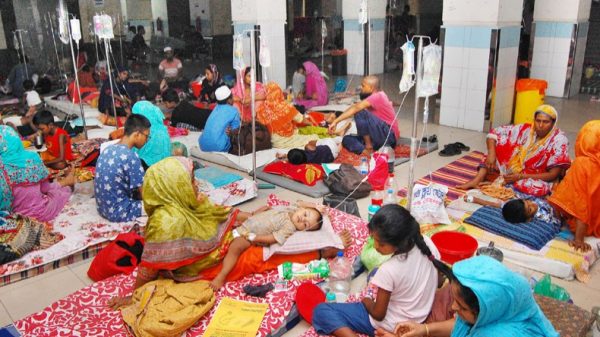Wrong mosquito control measures pose dengue risk to people in Bangladesh

Shawdesh desk:
Wrong mosquito control measures taken by the authorities of two Dhaka city corporations have exposed public health to a severe dengue outbreak with an unusual number of hospitalisations and deaths every day.
Dhaka city accounted for nearly 79 per cent of overall official deaths and 71 per cent of overall hospitalisations reported across the country this year.
Official accounts have so far confirmed 65 deaths and 11,298 hospitalisations across the country.
Health experts attributed the dengue casualties to the wrong fogging methods and poor efficacy of chemicals used to control larvae and adult mosquitoes in two Dhaka city corporations.
One of the two Dhaka city corporations – Dhaka South City Corporation – does not even have an entomologist, while Dhaka North City Corporation has only one.
Experts said that the city corporations, officially home to more than one crore people, clearly lacked proper planning and also failed to make local communities aware of the need to prevent dengue outbreaks.
‘The city corporations apparently failed to keep the dengue situation under control because of the wrong mosquito control methods and negligence,’ entomologist Manjur Ahmed Chowdhury told New Age.
‘Now, it is almost impossible to tackle the situation,’ he said.
In a bid to pass the blame onto Dhaka city residents’ shoulders, he said, the city corporations were conducting mobile courts to show that city dwellers harbour deadly Aedes mosquitoes in their backyards.
The city corporations are even fining people during these drives.
Manjur estimated that the actual number of dengue casualties would be 20 times higher than the official figures, which represent only 53 government and private hospitals in Dhaka city and a few other hospitals elsewhere in the country.
He said that the authorities should have destroyed mosquito breeding grounds between March and May.
The Directorate General of Health Services, in its pre-monsoon survey, released on Tuesday, found the highest mosquito density in Dhaka city in the past five years.
The mosquito density is even higher than in 2019 when Bangladesh recorded its highest-ever dengue hospitalisations of 1,01,354 people.
This year’s mosquito density is also higher than 2022, the year that saw the highest-ever dengue deaths of 281, DGHS data showed.
Epidemiologist AM Zakir Hussain said that authorities should use vehicle-mounted fogger machines instead of hand ones for a better outcome.
‘Vehicle-mounted fogger machines are common in the West, although backpack containers may also be used,’ Zakir said.
He said that the city authorities neither had the capacity to engage people in creating awareness nor tried to do it through third parties like non-government organisations and volunteer ones.
Jahangirnagar University zoology professor and vector management expert Kabirul Bashar said that the situation would continue to get worse in the coming days as city authorities could not engage people.
‘If the city authorities said that they could not go door to door. This is unacceptable. I urge the authorities concerned to make seven to eight blocks in each ward, conduct crash programmes, and make people aware,’ he said.
He also said that they should take a separate year-long programme for dengue alone.
Dhaka North City Corporation mayor Atiqul Islam said on January 21 that he had realised that the methods of killing mosquitoes in Dhaka city were wrong while observing the mosquito-eradication programme in Miami in the United States of America.
The north city authority shared the mayor’s realisation with the media through a press release issued on the day, as Atiq led a 16-member delegation to a workshop in the US.
DNCC deputy chief health officer lieutenant colonel Md Golam Mostafa Sarwar told New Age on Friday that they had completed all of their formalities to use the laboratory of Jahangirnagar University, but the process remained stuck.
He said a ship from Singapore was scheduled to arrive by July 12 carrying biopesticide for mosquito control.
He said that they were trying to engage people through religious leaders and school teachers to create awareness.
‘We are trying our best to overcome the situation. We cannot go to every house, but we clean the surrounding areas,’ he added.
DSCC chief health officer Fazle Shamsul Kabir told New Age on Tuesday that they did not use insecticides without 90 per cent efficacy.
Dengue spread cannot be contained by city authorities alone; people’s awareness and participation are essential, Kabir said.
He claimed that they train mosquito control workers every year and that their method was right.
At least 2,165 dengue patients, including 1,528 in 53 public and private hospitals in the capital, were undergoing treatment across Bangladesh on Friday.
Dengue, the mosquito-borne viral disease, killed one person in the capital city and left 182 people hospitalised across the country in the past 24 hours.
DGHS said that a large number of hospitals did not provide their data to the health directorate on Friday, a weekly holiday.
According to DGHS data, 566 dengue patients were hospitalised in January, 166 in February, 111 in March, 143 in April, 1,036 in May, 5,956 in June, and 3,320 in the first week of July.
At least six people died of the disease in January, three in February, two in April, two in May, 34 in June, and 18 in the first week of July. No deaths were reported in March, according to the data.
In 2021 and 2022, dengue cases were 28,429 and 62,382 respectively, according to official data.























Leave a Reply